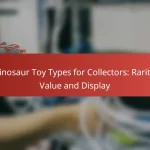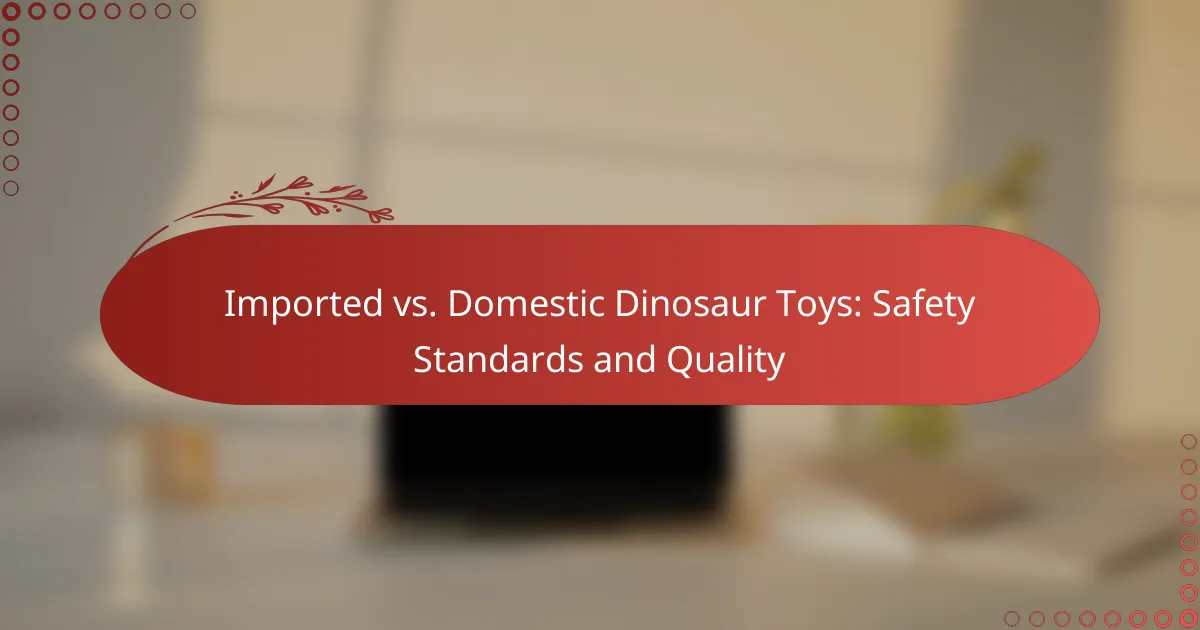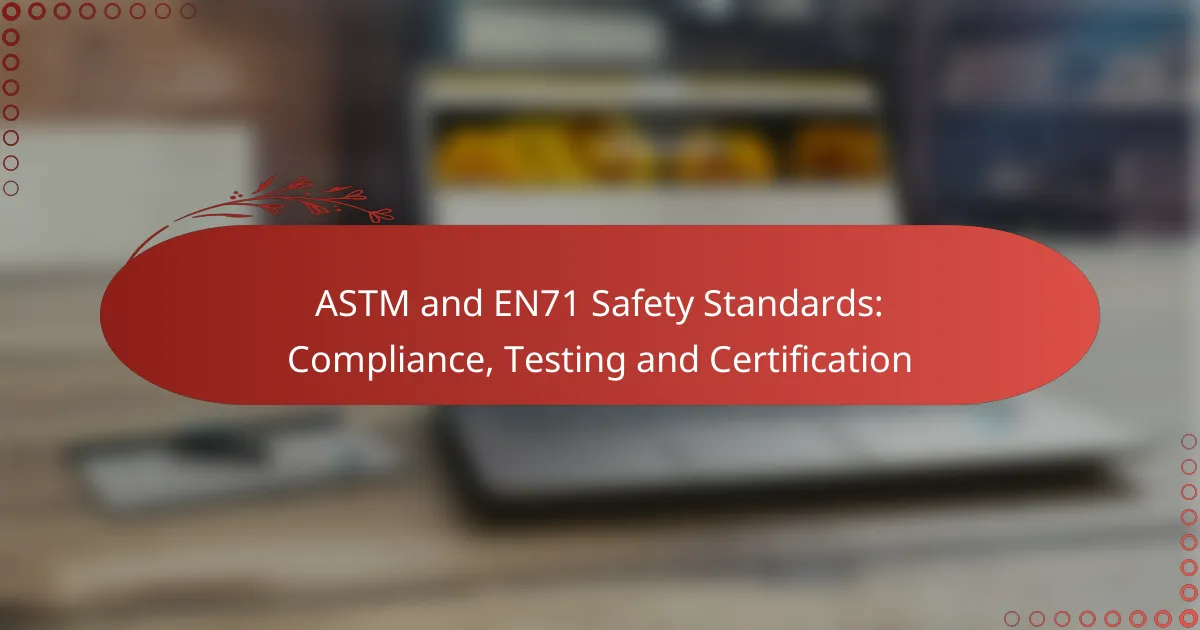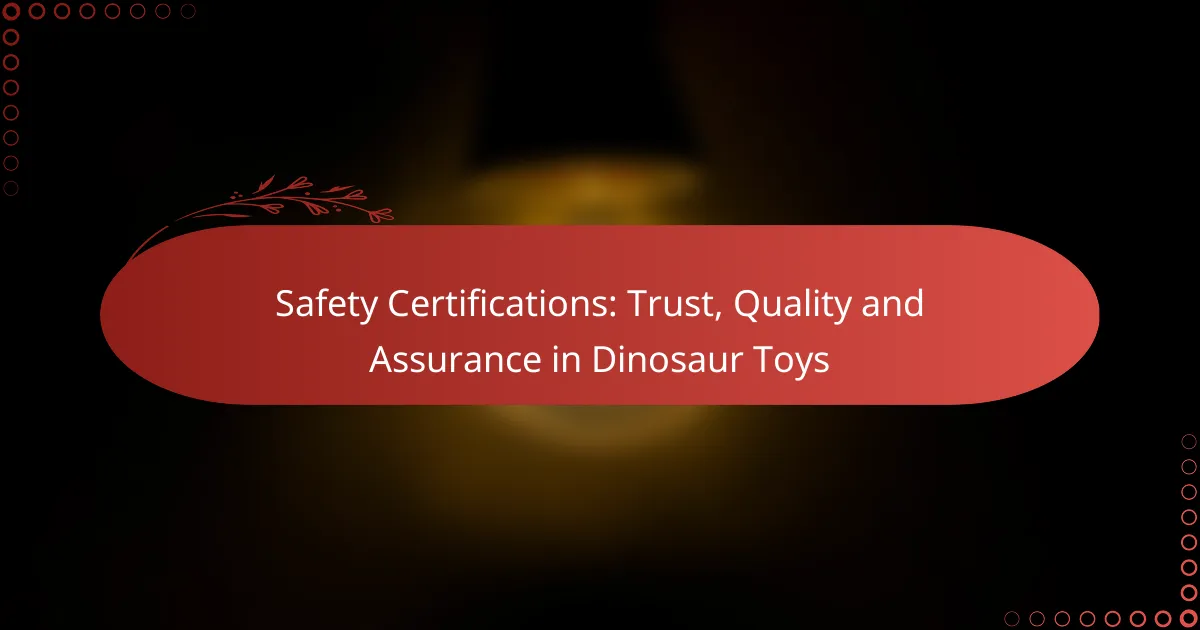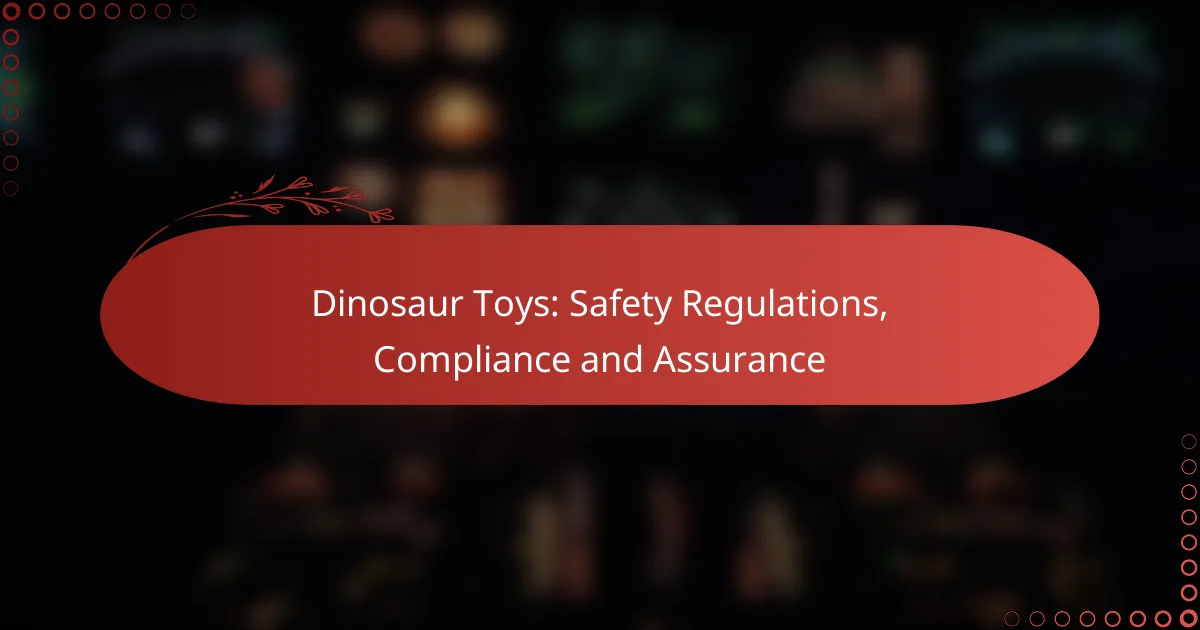When choosing dinosaur toys for children, understanding the differences between imported and domestic options is crucial, particularly regarding safety standards and quality. Both types must comply with stringent regulations set by organizations like ASTM and the CPSC, but imported toys may not always meet the same rigorous criteria as their domestic counterparts. This can impact not only the safety of the toys but also their overall material quality and design.
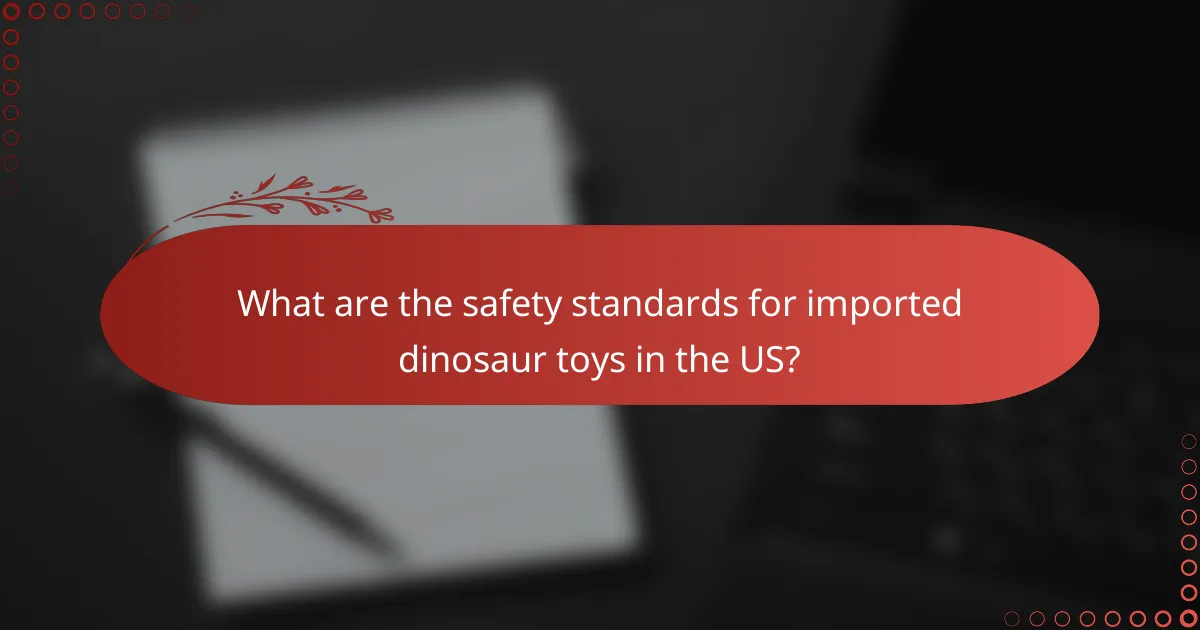
What are the safety standards for imported dinosaur toys in the US?
Imported dinosaur toys in the US must adhere to strict safety standards to ensure they are safe for children. These standards include compliance with specific regulations set by organizations like ASTM and the CPSC, which focus on material safety and overall product safety.
ASTM F963 compliance
ASTM F963 is a standard that outlines safety requirements for toys, including imported dinosaur toys. Compliance with this standard ensures that toys are tested for mechanical hazards, flammability, and toxic substances. Manufacturers must provide documentation proving their products meet these requirements before they can be sold in the US.
For parents, looking for the ASTM F963 label on packaging can be a quick way to verify that a toy has undergone rigorous safety testing. This standard is crucial for minimizing risks associated with toy use, especially for younger children.
Consumer Product Safety Commission (CPSC) regulations
The CPSC enforces regulations that govern the safety of consumer products, including toys. These regulations require that all toys sold in the US, including imported ones, must be free from hazardous materials and must not pose choking hazards for children under three years old. Regular inspections and testing are conducted to ensure compliance.
When purchasing imported dinosaur toys, check for CPSC compliance statements or labels. This ensures that the toys have been evaluated for safety and meet the necessary federal guidelines, providing peace of mind for parents and guardians.
Material safety testing
Material safety testing is a critical aspect of ensuring that imported dinosaur toys are safe for children. This testing evaluates the materials used in the toys for harmful chemicals, such as lead or phthalates, which can pose health risks. Toys must pass these tests before they can be marketed in the US.
Parents should look for toys that specify they are made from non-toxic materials and have undergone safety testing. Certifications or labels indicating compliance with safety standards can help in making informed purchasing decisions, ensuring that the toys are both fun and safe for children to play with.
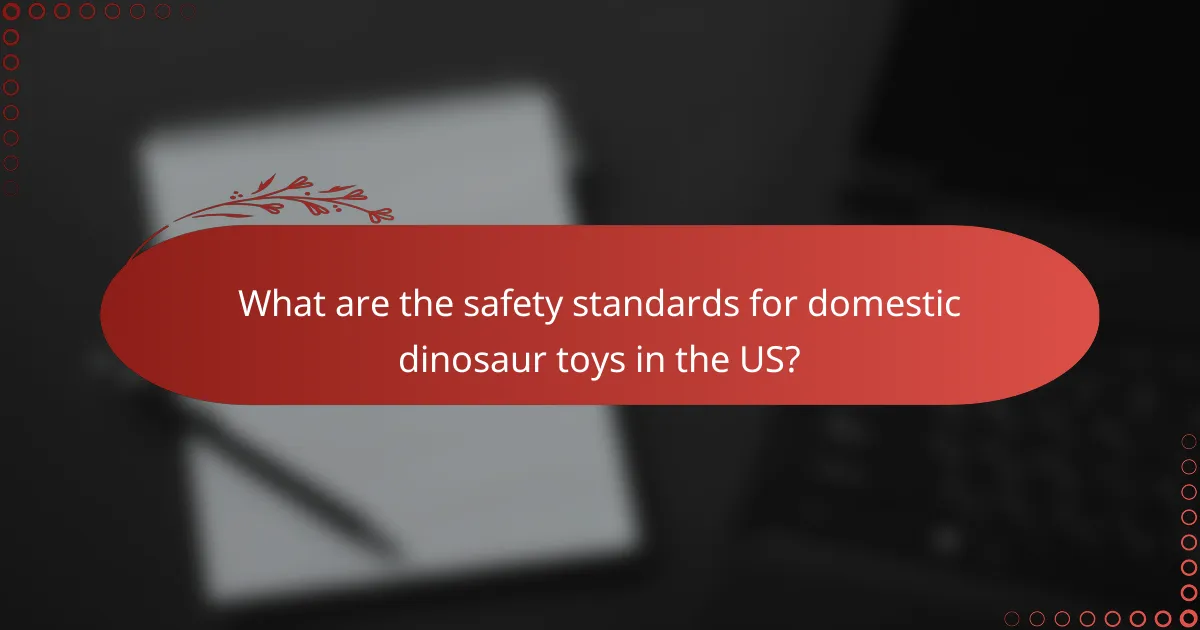
What are the safety standards for domestic dinosaur toys in the US?
In the US, domestic dinosaur toys must adhere to strict safety standards to ensure they are safe for children. These standards include compliance with ASTM F963 and regulations set by the CPSC, which focus on minimizing risks associated with toy materials and design.
ASTM F963 compliance
ASTM F963 is a standard that outlines safety requirements for toys, including those made from plastic, metal, and other materials. Toys must pass tests for mechanical hazards, flammability, and toxic substances, ensuring they do not pose risks to children. For instance, toys should not have small parts that could be choking hazards for young children.
Manufacturers often conduct third-party testing to verify compliance with ASTM F963. This testing helps ensure that toys meet the necessary safety criteria before they reach the market, providing peace of mind for parents and caregivers.
CPSC regulations
The Consumer Product Safety Commission (CPSC) enforces regulations that govern the safety of toys sold in the US. These regulations include limits on lead content, phthalates, and other harmful chemicals. Toys must be labeled with appropriate age recommendations and safety warnings to inform consumers about potential hazards.
Regular inspections and recalls are part of the CPSC’s efforts to maintain toy safety. Parents should stay informed about any recalls related to dinosaur toys to ensure their children are not exposed to unsafe products.
Manufacturing quality control
Manufacturing quality control is crucial in producing safe dinosaur toys. Companies should implement rigorous quality assurance processes to monitor production and ensure compliance with safety standards. This includes regular testing of materials and finished products to detect any defects or safety issues.
Additionally, manufacturers should maintain clear documentation of their quality control procedures. This transparency helps build trust with consumers and demonstrates a commitment to producing safe, high-quality toys for children.
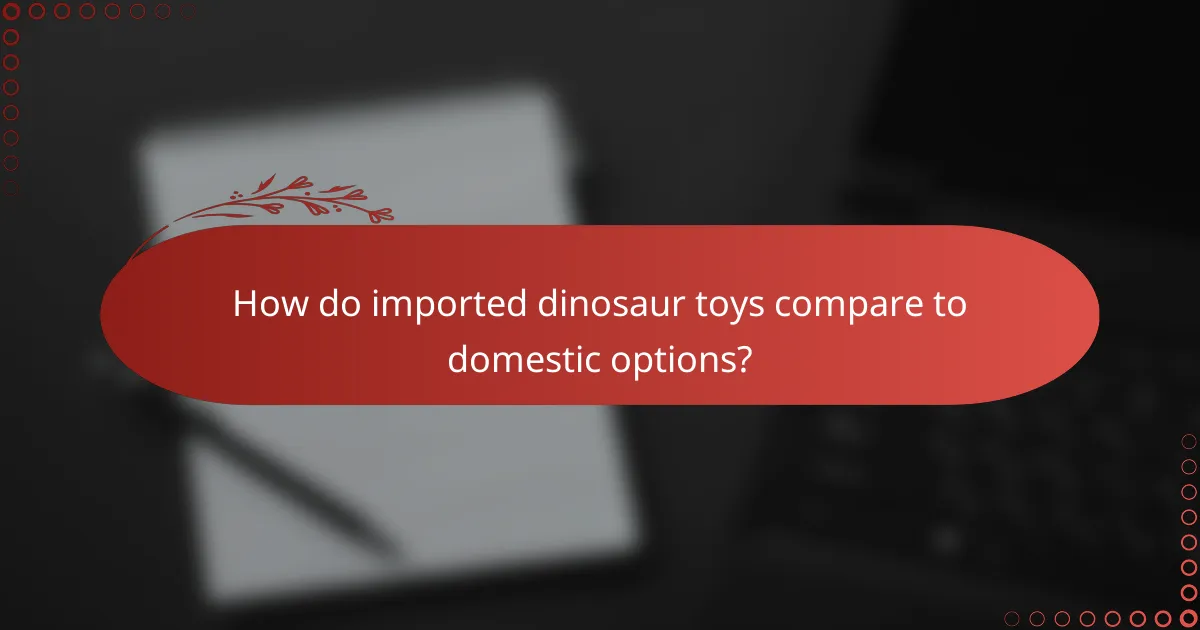
How do imported dinosaur toys compare to domestic options?
Imported dinosaur toys often differ from domestic options in terms of safety standards, material quality, and design. While many imported toys can be more affordable, they may not always meet the same rigorous safety regulations that domestic products do.
Price differences
Imported dinosaur toys are generally less expensive than domestic ones due to lower manufacturing costs overseas. Prices can vary widely, with imported toys often found in the low single-digit USD range, while domestic options may start in the mid to high single digits.
However, lower prices can sometimes indicate compromised quality or safety. It’s essential to weigh the cost against the potential risks involved, especially for toys intended for younger children.
Material quality variations
Material quality can significantly differ between imported and domestic dinosaur toys. Domestic toys often use higher-grade, non-toxic materials that comply with strict safety regulations, while imported toys may utilize cheaper plastics that could contain harmful substances.
When choosing toys, look for certifications such as ASTM or EN71, which indicate adherence to safety standards. Always check labels to ensure that the materials used are safe for children, particularly for those under three years old.
Design and educational value
Design and educational value can vary significantly between imported and domestic dinosaur toys. Domestic toys often emphasize educational aspects, featuring realistic designs and interactive elements that promote learning about dinosaurs and their environments.
In contrast, imported toys may focus more on aesthetics and lower production costs, potentially sacrificing educational value. When selecting a toy, consider its ability to engage children’s curiosity and enhance their understanding of paleontology.

What are the potential risks of imported dinosaur toys?
Imported dinosaur toys can pose several risks, primarily due to varying safety standards and quality controls in different countries. These risks include non-compliance with safety regulations, the use of harmful materials, and inconsistent quality control measures.
Non-compliance with safety standards
Imported dinosaur toys may not adhere to the stringent safety standards set by local authorities, such as the Consumer Product Safety Commission (CPSC) in the United States. This non-compliance can lead to toys that are unsafe for children, potentially causing injuries or health issues.
When purchasing imported toys, it’s crucial to check for compliance marks or certifications that indicate adherence to safety standards. Look for labels that specify compliance with recognized regulations to ensure the toy is safe for use.
Use of harmful materials
Many imported dinosaur toys are made from materials that may contain harmful chemicals, such as phthalates or lead. These substances can pose serious health risks, especially to young children who are prone to putting toys in their mouths.
To mitigate this risk, always review product descriptions and labels for information about materials used. Opt for toys labeled as free from harmful chemicals or those made from non-toxic materials to ensure safety.
Inconsistent quality control
Quality control practices can vary significantly between manufacturers, especially for imported toys. This inconsistency can result in toys that are poorly constructed, with parts that may break easily or detach, posing choking hazards.
When selecting dinosaur toys, prioritize brands known for their rigorous quality assurance processes. Research customer reviews and ratings to gauge the reliability of the toys and avoid those with frequent complaints about quality issues.

What are the benefits of choosing domestic dinosaur toys?
Choosing domestic dinosaur toys offers several advantages, including enhanced safety, support for local economies, and improved quality control. These factors contribute to a more reliable and responsible purchasing decision for parents and caregivers.
Higher safety assurance
Domestic dinosaur toys typically adhere to stricter safety standards compared to imported options. In the United States, for example, toys must comply with regulations set by the Consumer Product Safety Commission (CPSC), which ensures they are free from harmful chemicals and meet durability requirements.
Parents can often find certifications or labels on domestic toys that indicate compliance with these safety standards. This transparency helps in making informed choices, reducing the risk of purchasing unsafe products.
Support for local businesses
Purchasing domestic dinosaur toys directly supports local manufacturers and retailers, contributing to the economy. This support helps create jobs and fosters community growth, making it a socially responsible choice.
By choosing local products, consumers can also encourage sustainable practices, as many domestic companies prioritize environmentally friendly materials and production methods. This can lead to a smaller carbon footprint compared to imported toys.
Better quality control
Domestic manufacturers often have more direct oversight of their production processes, leading to better quality control. This means that defects or safety issues can be identified and addressed more quickly than with imported toys, which may be subject to longer supply chains.
Additionally, local companies may offer better customer service and support, allowing for easier returns or exchanges if a toy does not meet expectations. This level of service can enhance the overall purchasing experience for consumers.

What should consumers consider when choosing dinosaur toys?
Consumers should consider safety standards, material quality, and the origin of dinosaur toys when making a purchase. Imported toys may not always meet local safety regulations, while domestic options often adhere to stricter guidelines.
Safety standards for imported dinosaur toys
Imported dinosaur toys may be subject to different safety standards depending on their country of origin. Many countries have regulations that ensure toys are free from harmful substances, but enforcement can vary. Consumers should look for certifications such as ASTM or EN71, which indicate compliance with safety requirements.
It is crucial to check for labels that specify whether the toy is free from toxic materials like phthalates and lead. Additionally, consider the age recommendations provided by manufacturers, as these can help ensure that the toy is appropriate for your child’s developmental stage.
Quality considerations for domestic dinosaur toys
Domestic dinosaur toys often benefit from higher quality control standards, which can lead to better durability and safety. Many manufacturers in countries like the United States or those in the European Union are required to adhere to strict guidelines, ensuring that toys are made from non-toxic materials and are safe for children.
When evaluating quality, look for features such as sturdy construction and non-removable small parts that could pose choking hazards. Reading customer reviews can also provide insight into the long-term performance and safety of the toys.
Trade-offs between imported and domestic options
Choosing between imported and domestic dinosaur toys involves weighing cost against safety and quality. Imported toys may be more affordable, but they can come with risks related to safety standards and material quality. Conversely, domestic toys may be pricier but often provide greater peace of mind regarding compliance with safety regulations.
Consider your budget and the importance of safety for your family. If opting for imported toys, prioritize brands that are transparent about their safety testing and certifications. For domestic options, look for local companies that emphasize quality craftsmanship and safety in their products.


